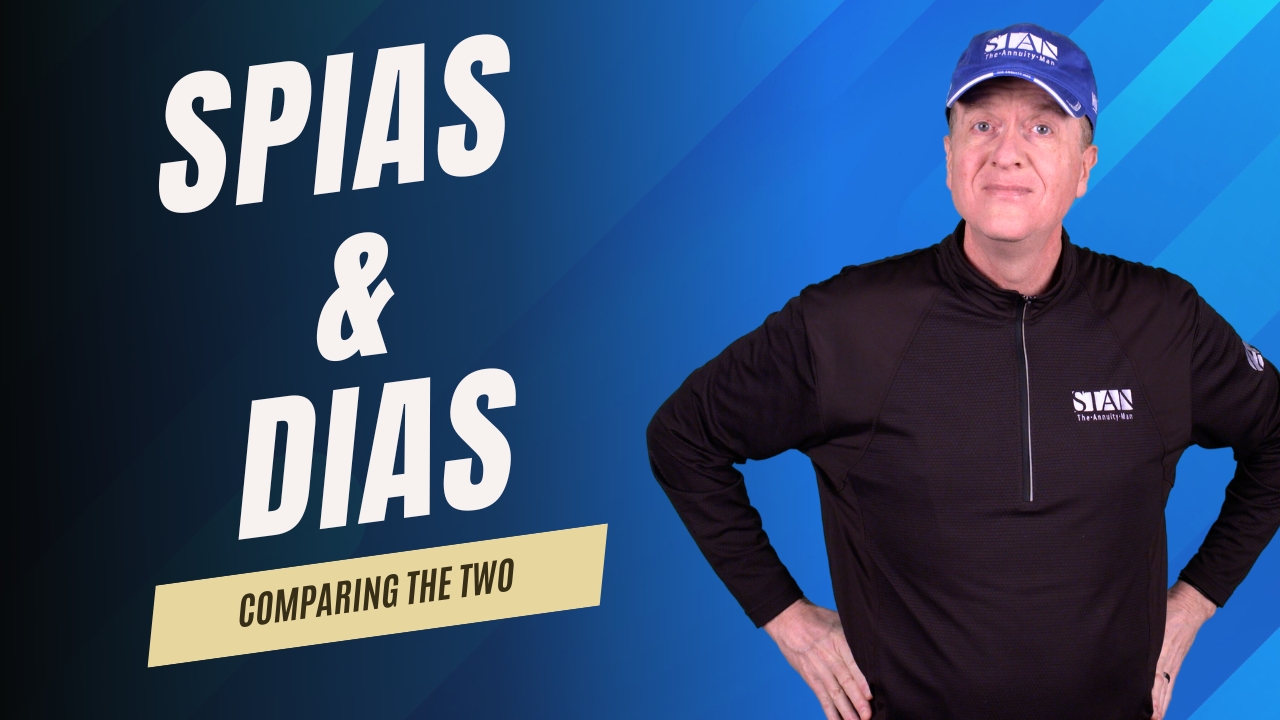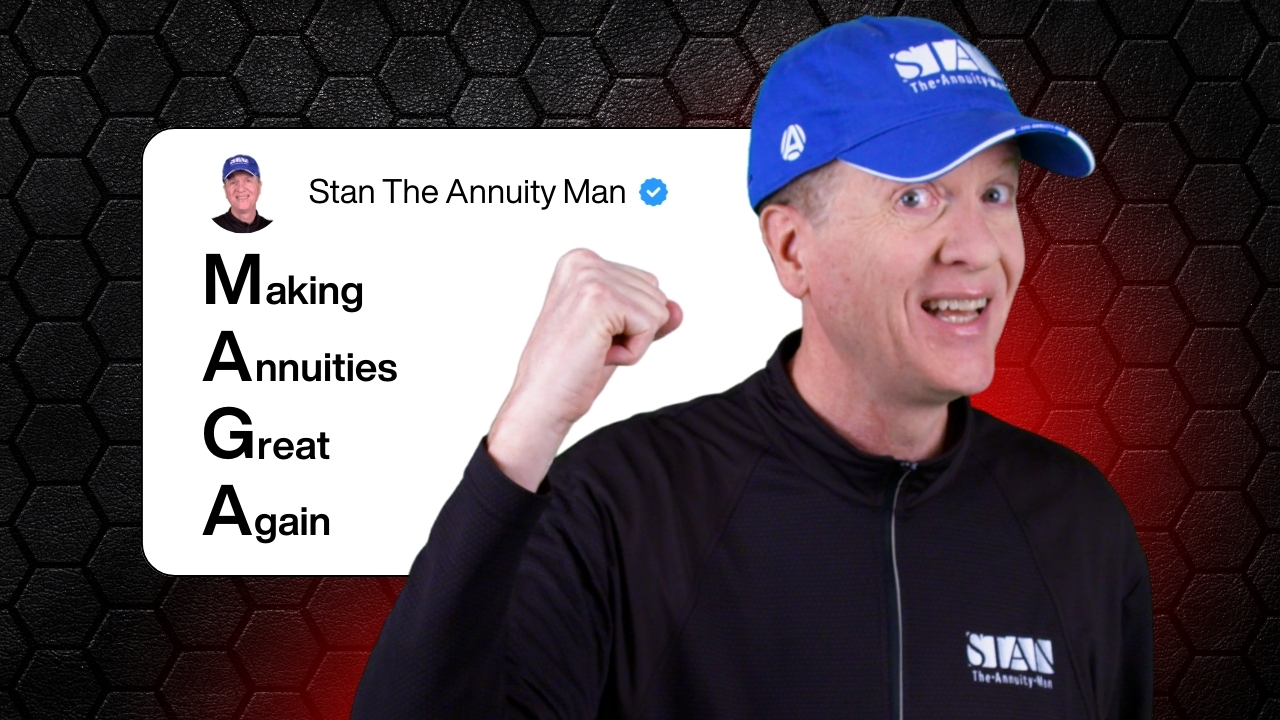Table of Contents
Annuity Scams: What to Watch Out For (TAM Classic)

Hi there. Stan The Annuity Man, America's annuity agent licensed in all 50 states. Today's topic is a good one, and I'm sure when you saw the title, you're like, "I'm going to read this one. I know he's going to go crazy." Annuity scams and what to watch out for. I'm going to talk about a lot of the nonsense proliferating across the fruited plain, how to protect yourself from some of these pitches, and some of the things that you're going to see that you and I wish would be more regulated.
Made up Titles
The first thing you should be aware of is there are a lot of people out there using titles that are made up out of midair. I've seen them, like senior advisor specialist, financial specialist for seniors, or something certified for seniors. That's nonsense. All of that's crap. If anyone has that on their card, take their card and rip it up right in their face and then throw the little confetti right at them because that's garbage. And there are some certification courses out there that charge these agents to have this on the card. It's a joke. I'm Stan The Annuity Man. That's not a certification, but I've been doing this for decades, period. People think of Bernie Madoff or Ponzi schemes when it comes to annuities scams. That's not what we're talking about.
Payable to Who?
To understand, the annuity industry is highly, highly regulated. The Fixed Annuity space is regulated at the state level. Variable Annuities and those security-type annuities are at the federal level with FINRA. The point of the matter is there are no scams. The only thing I would tell you is when you buy an annuity, and hopefully, it's through us, The Annuity Man, licensed in all 50 states. We'd love to talk with you and help you. The money's going to be at the annuity company. One thing to look out for is when someone says to you, "Hey, make the check payable to my firm," or something like that. No, it's going to go to the annuity company. The money's going to be transferred to the annuity company. If you're writing a check, the check will be made payable to the life insurance company. Life insurance companies issue annuities.
That's common sense, but I often read these stories occasionally where people made the check out to the agent or something. That's crazy. It's to the annuity company. So, if you use us, we never touch the money. Money's going to go to the annuity company. You're going to have access to your online account with most of these companies. You're going to get a statement from that company in the mail every year. We'll help you get across the finish line, do all the paperwork, and do all that and all the administrative stuff. But that's the first thing.
Indexed Annuities
Another thing to watch out for, and this is a product that we actually sell a lot of. Still, we primarily use it as a delivery system for income guarantees, and it's the Indexed Annuity, Fixed Index Annuities. To me, this is tragic. These are great products that are improperly sold by too many agents today. And they'll talk about market upside with no downside, or market participation with principal protection. They'll talk about upfront bonuses and free money. Especially in a volatile market where some people have lost money, they'll approach you and say, "Well, you've lost $100,000. This annuity gives a 25% upfront bonus, a 30% upfront bonus, or a 10% upfront bonus." That's not free money.
These are contracts. I understand that you're not going to get anything more than what's in that contract. But the way that they're pushed is too good to be true. The typical Indexed Annuity bad chicken dinner seminar pitch is that you get an upfront bonus and market upside with no downside. You get free long-term care. All that sounds good, but all of that's not true. The Indexed Annuity is a CD product, period. End of story. That's what they were put on the planet to do in 1995. There's no philanthropist that annuity companies giving money away and wake up in the morning and saying, "These upfront bonuses. let's just give away money." There's attachments to it. In many cases, you have to hold it for a certain amount of time.
In a lot of cases, that bonus goes to the income account. That doesn't mean the income account is the best way to do that. A lot of times, we quote for Income Riders. The ones without bonuses have higher contractual guarantees. Just remember this. If it sounds too good to be true, it is every single time with annuities, period. That's the Indexed Annuity. That's the one thing I want you to watch out for.
Long Term Care
The third thing I want you to watch out for is the whole long-term care part of that Indexed Annuity pitch. The reason I'm segmenting that out is because if you have long-term care, and there's three types of long-term care. Traditional, and then there are two types of asset-based long-term care using life insurance, and then there's a third one, which is actual annuity long-term care. Just remember this: long-term care is a tax-free benefit. You have to go through some sort of underwriting to qualify for true long-term care.
Now, we don't sell long-term care. I have a relationship with one of the top agents. That's all he does is long-term care. If you want to explore that, he's a straight shooter like me. He's going to tell you the truth. I'll give you his name and number, and you can look for real long-term care. But what you have to watch out for is the part of that bad chicken dinner seminar, expensive steak dinner seminar index annuity pitch. They'll say, "You get free long-term care without any type of underwriting." That's not true. Long-term care is a health insurance product. Indexed Annuities are life insurance products.
The health insurance product is part of long-term care; you're not getting long-term care if you buy an Income Rider attached to an Indexed Annuity. You're getting what's called confinement care and enhanced benefits. Yes, it is a guaranteed issue, but in the South, I'm a Southerner, so I have all these sayings, those types of policies where they say, "Well, if you need it for long-term care, the money doubles. It's a doubler." What that really means is that when you get sicker, you get your money back quicker; they just ramp up the giving back of your money. I'm not sure if that's a great benefit, but if you're drinking a bottle of Jack Daniels a day and smoking six packs of non-filtered cigarettes, that's the only thing you're going to get. But you never, ever, ever, ever, ever cancel your current true long-term care policy to buy an Income Rider with a doubler. That, to me, is the scam of all time. It just drives me crazy.
So, the first was about Indexed Annuities and nothing against them. Again, everybody's like, "Well, you hate on the Index Annuities." No, we don't. We actually like them. They're not too good to be true, but they're good if you understand them for the contractual guarantees, place them properly, and understand them for what they can do, what they will do, and the contractual guarantees. It's just the go-go product right now. Another reason that Indexed Annuities have hit the first two of the top three is because it's a high-commission product, too.
Commissions
Now, with all annuity types, the commissions are built into the product. Just remember this. The shorter the duration, the lower the commission. The simpler the product, the lower the commission. Indexed Annuities are not simple products. They're very, very hard to understand with all the caps and spreads, participation rates, call options, and all that stuff. Typically, you have to lock your money in seven to 10 years, with most of them out there. There's a correlation to high commissions. That's why people always call me, "Well, you're the only one who didn't recommend an Indexed Annuity." Yeah, because I don't fit a square peg in a round hole by selling them. Once again, we don't have any problem with them, but it's not a one-size-fits-all.
Food Seminars
The last thing I implore you to be aware of are these food seminars where you get the invitation in the mail. It scares the heck out of you. It's either a fear or greed pitch, and they're taking you to a really good steak house or something, or you're getting free food. And then the agent will stand up there and try to sell you something. Unfortunately, most of the time, it's Indexed Annuities again. But the food stuff, I always tell people, do like my mom does, "Swallow the food, not the sales pitch." Because typically, they're going to be selling one type of product to everyone there. I want you to think logically about that the next time you go there and eat the food.
Just think about it. If that was a doctor up there and they were prescribing the same medication to everybody in the room with you. It's insanity. If they're prescribing, or in this case, the agent or advisor's pitching one solution. It doesn't have to be annuities. I saw one recently as I live part-time in Florida, and they were pitching some real estate LLC limited partnership with some ungodly double-digit returns. Anytime it sounds too good to be true, it is. It doesn't have to be annuities. Just be careful of the food pitches.
Internet Advertising
I'm going to extend that a little bit as a thing to be aware of: internet advertising. Internet advertising for annuities is the wild, wild west. It completely blows me away to see what these characters can get away with. And in a lot of cases, they're running the ad. It says, "13% return or 17% return with no downside." First of all, if you click that, you're the dumbest person in the room. You're dumber than a box of hair. You deserve what you get if you really believe that, and you buy that crap. But what they're doing is they're taking your name and selling that lead typically for $150 to $300 each time they sell it. And they'll sell it to four or five agents, and those agents will come at you. And if you've ever done that before, you almost have to get in a witness protection program to get out of the way. So, bottom line, I don't know if scam is the word because it's a highly regulated industry.
What you need to be aware of and be careful with are some of the over-hyped sales pitches attached to annuities. If it sounds too good to be true, it is every single time. And remember this. You own an annuity for what it will do, not what it might do. Be careful out there. We would love to work with you. We do not do that. We tell the truth, period, on all these products. And we have the guts to tell you if you don't need an annuity. Do me a favor. Book a call, and I'll see you on the next Stan The Annuity Man blog.
Never forget to live in reality, not the dream, with annuities and contractual guarantees! You can use our calculators, get all six of my books for free, and most importantly book a call with me so we can discuss what works best for your specific situation.
.png)
.svg)











































.jpg)
.jpg)


.jpg)
.jpg)
.jpg)
.jpg)
.jpg)

.jpg)



.jpg)
.jpg)
.jpg)
.jpg)
.jpg)
.jpg)
.jpg)


.jpg)
.jpg)
.jpg)
.jpg)

.jpg)
.jpg)


.jpg)

.jpg)

.jpg)

.jpg)
.jpg)
.jpg)

.jpg)
.jpg)
.jpg)

.jpg)
.jpg)
.jpg)



.jpg)







.jpg)